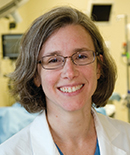- Fitness to Practice — Conundrums Along the Continuum (SEA610)
- 1-3 p.m. Tuesday
- BCEC Room 254AB
Gauging a physician’s competency does not end with residency. Supervisors must assess fitness to practice whether an anesthesiologist is just beginning residency training or approaching retirement. Tips to improve the assessment process will be presented during a Tuesday panel assembled by the Society for Education in Anesthesia.

Stephanie B. Jones, M.D.
Speakers will use case-based examples to examine assessment challenges supervisors face and actions they can take, starting with trainees. Other topics will include moving from residency to practice, returning to practice after taking time off and the fitness of aging anesthesiologists.
One of the most difficult judgments of fitness starts with residents who must prove they are capable of practicing without constant oversight, said session moderator Stephanie B. Jones, M.D., Vice Chair of Education in the Department of Anesthesia, Critical Care and Pain Medicine at Beth Israel Deaconess Medical Center.
“In the current malpractice environment, how do you ensure that we are allowing our residents to learn what they need to learn and develop a degree of autonomy?” Dr. Jones asked. “How much line can you feed them, and what is safe for the patient? We will be talking about who is responsible if there is an event in the O.R.”
The next challenge is hiring anesthesiologists to practice after they complete residency.
“How do you know the person you are hiring is competent to practice?” Dr. Jones said. “We have always had this chronologic training model where you assume that after four years they are ready to practice. That is probably not the best way to go about things. We will talk about how you can go back and do quality improvement of residency training at the program level.”
Questions about competency also arise if an anesthesiologist has taken time off from practice and returns to work. Adam Levine, M.D., of Mount Sinai Health System, will explain his organization’s retraining program for returning physicians.
“He will speak to cases they have dealt with both from a positive standpoint and those that did not work out,” Dr. Jones said. “Mount Sinai uses a combination of a simulation environment as well as clinical retraining.”
The final speaker is psychiatrist Ronald Schouten, M.D., J.D., who will examine the assessment of aging physicians or others who appear to have experienced a decline in skills.
“How do you put a finger on that and decide in an objective manner if they can continue to practice?” Dr. Jones said. “He will talk about the differential diagnosis of workplace behavior concerns and fitness for duty evaluations.”
The interactive session will poll attendees and include time for speakers to answer questions from the audience.
“We want to be able to know that the people who are providing anesthesia are performing to the best of their ability from the day they get out of training to the day they retire,” Dr. Jones said. “It is important that we objectively evaluate that throughout the continuum of practice.”
Return to Archive Index